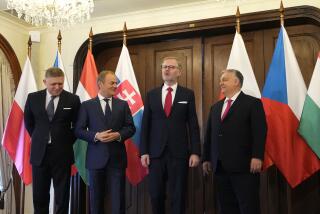Baltics Refuse to Join Talks on Forming Federal State : Soviet Union: They will proceed with secession. Gorbachev suffers a setback.
- Share via
MOSCOW — The Baltic republics of Estonia, Latvia and Lithuania declared Saturday that they will not participate in the negotiations to transform the Soviet Union into a federal state with broad autonomy for its members.
The three Baltic presidents, meeting in the Latvian beach resort of Jurmala, said their republics instead will proceed with talks on their own independence from the Soviet Union and on their future relations with Russia and the other republics that remain in the federal union.
The three presidents--Arnold Ruutel of Estonia, Anatolijs Gorbunovs of Latvia and Vytautas Landsbergis of Lithuania--also agreed to negotiate jointly with the Soviet central government or, if Moscow does not agree to this “three-plus-one” formula, then to coordinate their talks on independence.
The Baltic decision, while expected, will undermine President Mikhail S. Gorbachev’s efforts to hold the Soviet Union together in the face of the centrifugal pressures of growing nationalism in virtually all its 15 constituent republics.
Gorbachev, who is struggling despite increasing challenges to maintain the Soviet Union’s integrity as a state, had hoped that the Baltic republics would at least join the negotiations on the treaty establishing a new federal union even if they did not join the union.
Their decision not to remain even as observers could add to sentiment, already considerable in republics such as Armenia, Georgia and the Ukraine, that the negotiations as now constituted are futile and should be abandoned in favor of open-ended talks without preconceptions of the result.
The Baltic drive for independence was appreciably strengthened by an agreement reached Friday by the Estonian, Latvian and Lithuanian presidents with Boris N. Yeltsin, the populist president of Russia, the largest Soviet republic, on continuing cooperation as they secede from the Soviet Union.
A series of treaties will be drafted in the next two months that should go a long way to ensuring a smooth transition--as well as recognizing the independence of the Baltic states because this will be part of the preamble of each agreement.
In the agreement reached with Yeltsin, the three Baltic presidents said negotiations will begin immediately on long-term cooperation in economic development, trade, science and technology and cultural relations. Citizenship, repatriation and welfare benefits will also be included in the treaties.
In terms of Soviet politics, the agreement puts Yeltsin well ahead of Gorbachev in coping with the country’s impending disintegration, for Russia under Yeltsin will be playing a larger and possibly more effective role in shaping the new relationship than the central government under Gorbachev.
“Latvian independence must definitely be recognized in the first, the political section of our treaty,” Yeltsin said in an inter view with Latvian television.
Yeltsin met with the Baltic presidents at Jurmala, where he has been vacationing, and then joined them and their wives for a dinner of fish that he and Gorbunovs had caught. Landsbergis, a concert pianist and professor of musicology, played the piano to entertain the party, and Yeltsin’s wife assembled the participants for a group photo.
As shown on Latvian television in a report from Jurmala, the convivial and relaxed Yeltsin was a marked contrast to Gorbachev, usually tense and irritated when dealing with Baltic questions. The effect of the report, probably intended, almost seemed to be one of reassurance that here was a man with whom the republics could work.
Gorbachev earlier this month called a new union treaty vital to his plans to transform the country’s centrally planned, state-run economy into one in which the market forces of supply and demand and entrepreneurship predominate.
In their declaration, issued Saturday after a meeting that continued well past midnight, the three Baltic presidents said their republics have no territorial or other claims on each other.
More to Read
Sign up for Essential California
The most important California stories and recommendations in your inbox every morning.
You may occasionally receive promotional content from the Los Angeles Times.










